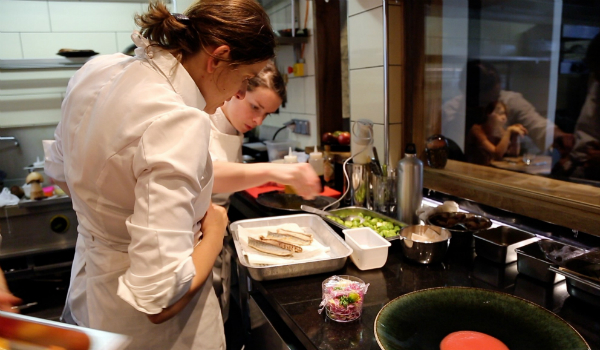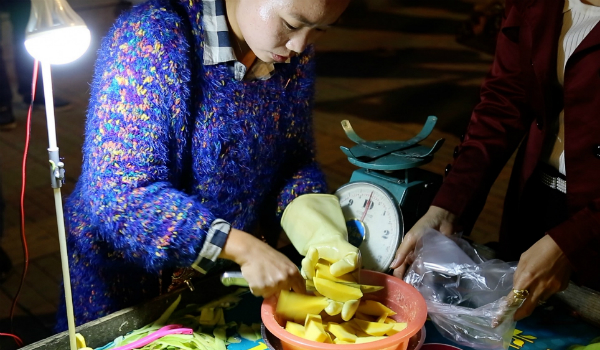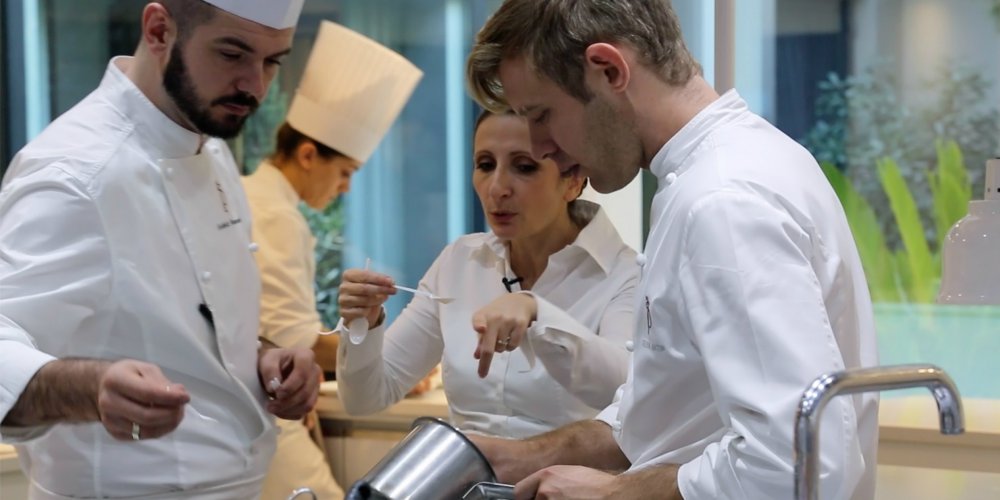Désirée de Lamarzelle: The starting point of your film is with your google search of the word "chef" whose answers are essentially masculine. How was your documentary project born?
Vérane Frédiani: I really wondered what could improve the visibility of talented women in any professional field. Gastronomy has imposed itself on me as the ideal example to showcase female leaders that one never sees. We are led to believe that there are not many of them, although they are very numerous. We must try to understand why. I left from there.
A journalist tells you in the report: "we do not know how to find them, they are sometimes in small restaurants, but not known". There are fewer women leaders than men?
The first reason is that investors are less important in restaurants run by women. Women at the same level of creativity as the latter stagnate in small structures. That is to say they have the potential, but behind they are not invited to festivals and little is done to make them known either by the press or by investors. Even if they are more and more numerous it is not normal that there are as few starry women. We must give them the means to move forward and see big, to be creative at 200%.

La Ferme Productions
And why do they not impose more when they have so much talent?
Women already have a problem of legitimacy vis-à-vis themselves. Often they find it difficult to value themselves and say that they want more because they deserve it. For example, women are reluctant to say that they have worked hard because they do not want this admission of effort to be associated with some form of disability. It would not happen to men. I think we have a problem of self-confidence to resolve.
It seems that women leaders did not exist before Anne-Sophie Pic, Hélène Darroze ...
Today, anything that is not on the internet has never existed. Type "the bourgeois mother", "Fernande Allard", there is nobody or rather very little information about them. And so they are forgotten. It is also because of this lack of collective memory that there are very few women in the history of gastronomy. But in reality there have been many professional cooks. Without forgetting those who officiated with talent in the small inns, the restaurants of province. To make one think that there were only men among the chiefs is a big lie.
Your documentary rehabilitates these women to give them the desire to dare.
Of course. As a woman there is a great need for female examples. The more there will be, the more you will dare. When I interviewed the Blue Cordon the girls for the movie, every time I asked the question: who is your favorite female chef? They had no names to give me, they did not even know them. Apart from Anne-Sophie Pic, Elena Arzak ... By setting an example, it will create careers, desires, and dreams.
What do you expect from the film?
I especially expect female solidarity. I would like a restaurant client to decide to pay, to ask for a wine list, and to go and dine with a chief woman instead of a chief, instead of a large restaurant with her husband, is their wedding anniversary. That she decides to spend with two girlfriends 300 euros per person because today they make a living. One can also indulge with his money and say to himself "I like to eat, I go to a big restaurant held by a woman".

La Ferme Productions
Behind this documentary about women leaders, there is also the idea of allowing themselves to enjoy a pleasure ...
Yes exactly. It is a whole society that, thanks to gastronomy, can change.
In addition to solidarity, what are the other levers to accompany women leaders?
I think of the important budget that the public chains put in historical documentaries, that should dedicate a part to rehabilitating the women ... It would be necessary that one of the rooms in the future museum in the city of the international gastronomy in Lyon be called " Eugénie Brazier. That there is a will of state not to forget them in the school programs. Be sure that girls do not consider that cooking is just normal, but make them understand that it is also a profession. Finally, the third lever is the networks. Networks of men are very powerful, women have to create their own networks. It's not against men! But we are advancing in our careers, whether in the kitchen or something else, thanks to the networks.

La Ferme Productions
Where and how will your film be shown?
The release is on July 5, in about thirty rooms in France. Especially in cities where there are independent cinemas, and which have been committed over several weeks: Marseille, Aix, Bordeaux, Montpellier, Lyon, Lille, Paris.
Even though I have a good return from the journalists and in theaters, I find it hard to find a distributor for the film. I find myself disseminating it with my own company. Their reaction was to ask me what the scenario was, and what I was getting at. Except that for women to advance, you have to see my film.
"In search of women leaders" by Vérane Frédiani
French documentary, 1 h 30, indoor since July 5


